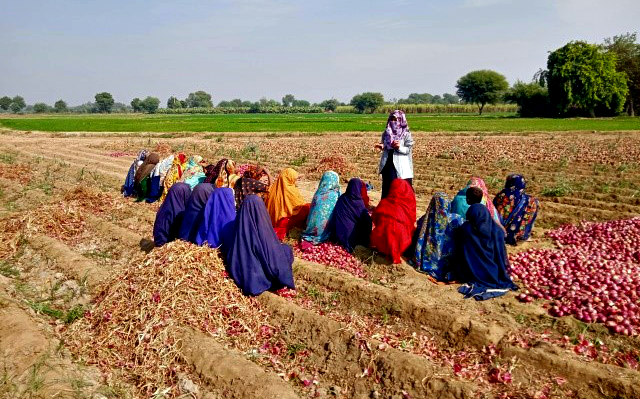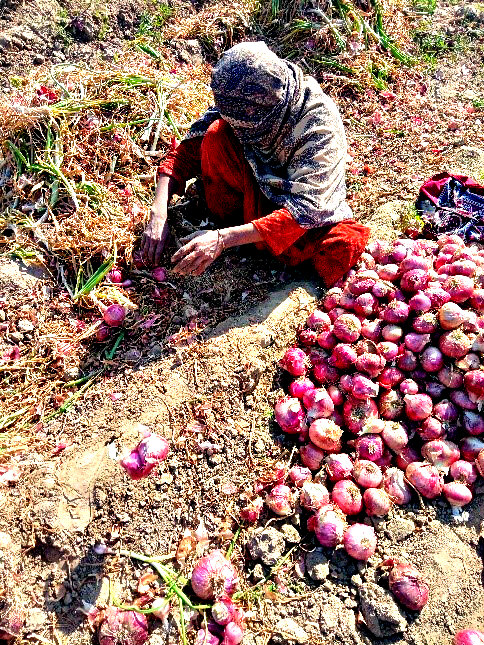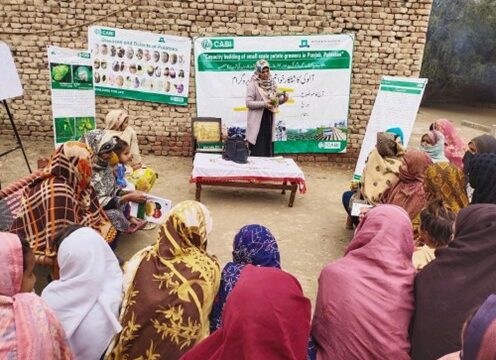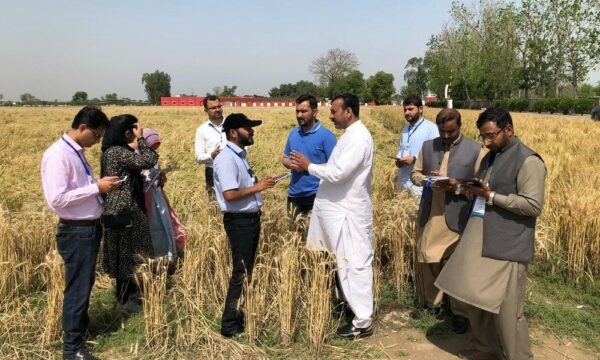
Women play a key role in agriculture in Pakistan that has not always been acknowledged. They are mostly deprived of access to information, knowledge and skills enhancement. This leads to poor technical skills with minimum wage employment, no recognition and no role in family decision-making.
This situation also contributes to a poor agriculture production system as women constitute a major part of the labour force in agriculture. However, with poor skills and minimum technical knowledge, they are not able to contribute as much as they could. Therefore, gender inclusion is vital for value chain development.
Rural women working in onion production in District Tando Allahyar, Sindh, have similar problems. A CABI team has been working to develop an improved onion value chain in their village through the ACIAR-funded ‘Strengthening Vegetable Value Chains in Pakistan’ project.
These women lack the knowledge of improved onion production technology and this results in no community support, minimum communication with other women and men farmers and no leadership role in the community.
‘Whole family’ approach
Such women need technical support and access to the improved onion production system. This is because they constitute a significant portion of the labour force – playing a key role in sustainable onion production.
Therefore, any attempt to develop the onion value chain in the village will not be successful without their active participation and skills enhancement. The ‘whole family’ was followed to enhance gender engagement in project activities.
In the ‘whole family’ approach, all family members are engaged in information dissemination through a ‘women social mobiliser.’ This person has been proved effective in a rural context.
The female social mobiliser engaged 10 women farmers and 3 labourers. Following the ‘whole family’ approach, the men were sensitized to the needs of women’s participation and to get support from the family.

Training was provided by the female social mobiliser to adopt best practices such as onion bulb cutting, sorting and grading to deliver customer valued produce. The social mobiliser engaged the 30 women in awareness activities such as field days.
Capacity building
The women were successfully engaged in project capacity building activities and they improved their technical skills to implement postharvest best practices. This included producing healthy seedling, curing onion for two weeks and proper cutting, sorting and grading of the onion crop.
With the building of their technical capacity to adopt these interventions in the field, the women achieved an increase in their income/wages, improvement in bulb quality (by being part of decision making), and enhanced support from community members compared to than before.
An enabling environment was created for rural women to participate in the onion value chain activities and be respected in the community for their quality work. Better communication between women and men to improve bulb quality, shelf life leading to improved profit were also realised.
The bulb quality was increased with an improved shelf life of 6 months at home for cooking. Women were also able to play a leadership role in the community. For instance, a women farmer works as a leader and role model for other women in the village.
Improved quality and profit
In this way, she guides other female farmers about the value chain approach and the best practice interventions to improve quality and profit. Her family has also been producing high-quality onion continuously for the last three years by following the value chain approach and SVVCP best-practice interventions. This has meant the female farmer has been receiving higher monetary returns compared to the traditional farmers since adoption of ‘best practice’ interventions.
The ‘whole family’ approach has been effective in engaging the capacity building activities that lead the enhancement of their understanding of customers’ quality requirements and technical skills to produce that quality.
Based on higher returns for high quality, women’s wages have increased due to improved skills and quality work by adopting SVVCP best-practice interventions and behavioural shift from production-oriented to market-oriented.
The women also scaled out these SVVCP-designed interventions by training other women in the same or nearby villages. Women have reported satisfaction with their increased income and the improved onion quality, shelf life and newly acquired social respect in their society.
Additional information
Main photo: Training on SVVCP ‘best-practice’ interventions is delivered to the women farmers (Credit CABI).
Authors
Ms Iqra Sultan – Social Mobiliser, SVVCP
Dr Habat Ullah Asad
Mr Azeem Haider Naqvi
Contributors
Dr Gomathy Palaniappan, School of Agriculture and Food Sciences, The University of Queensland
Dr Tim Sun, Teams Coordinator – SVVCP
Mr Muhammad Asif – Project Manager, SVVCP
Acknowledgement for financial support
The Australian Centre for International Agricultural Research (ACIAR)
1 Comment
Leave a Reply
Related News & Blogs
Revolutionizing crop protection in Pakistan: Registration guidance approved to promote sustainable biopesticides
To celebrate the longstanding achievement in the crop protection sector of Pakistan, CABI organized a dialogue on ‘Regulatory Harmonization in Pakistan for Maximum Residue Limits and Biopesticides’ in Islamabad, Pakistan. The event saw the approval of…
14 February 2024





Undoubtedly, rural women are playing a vital role in the agriculture sector in Pakistan.